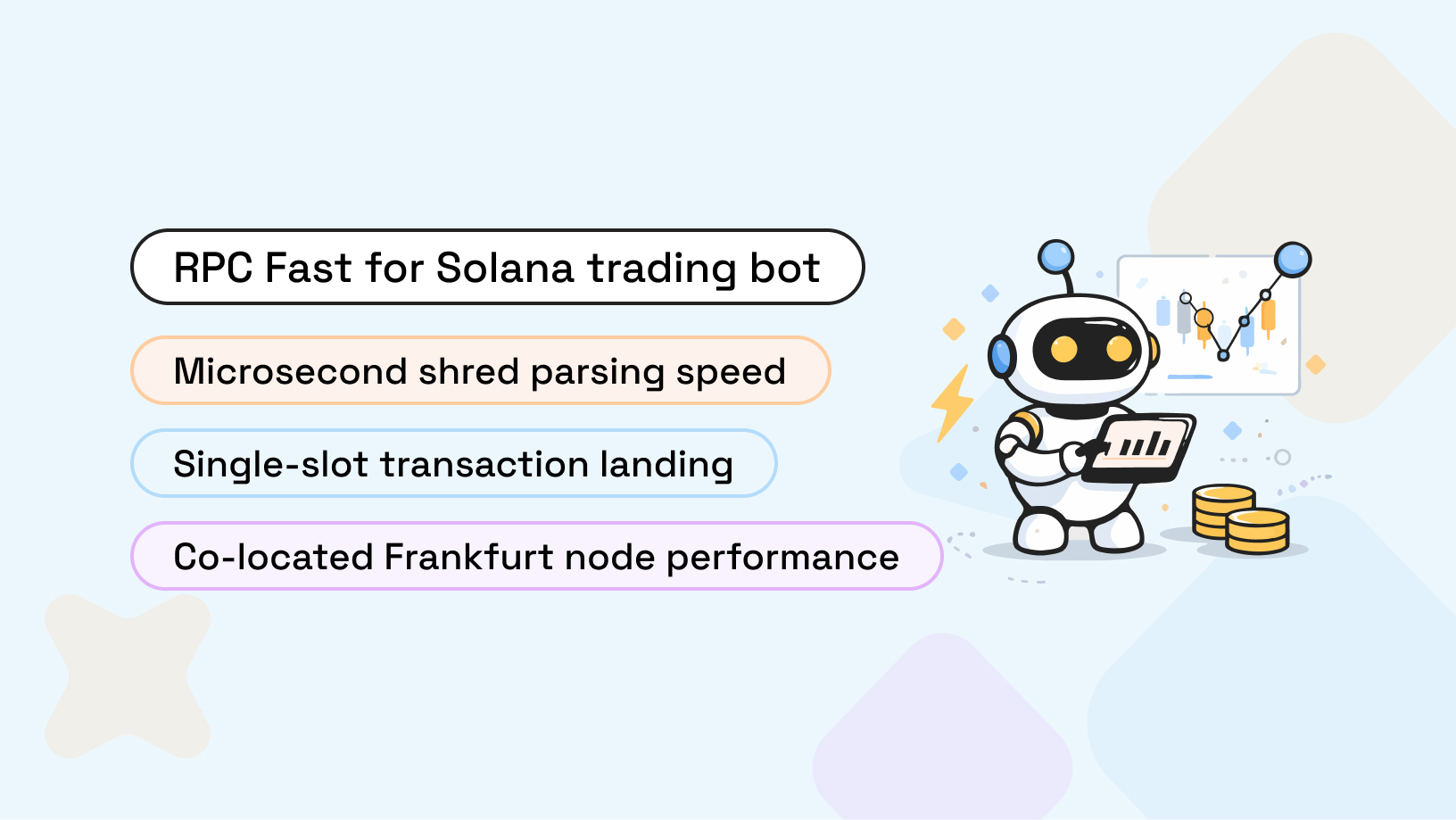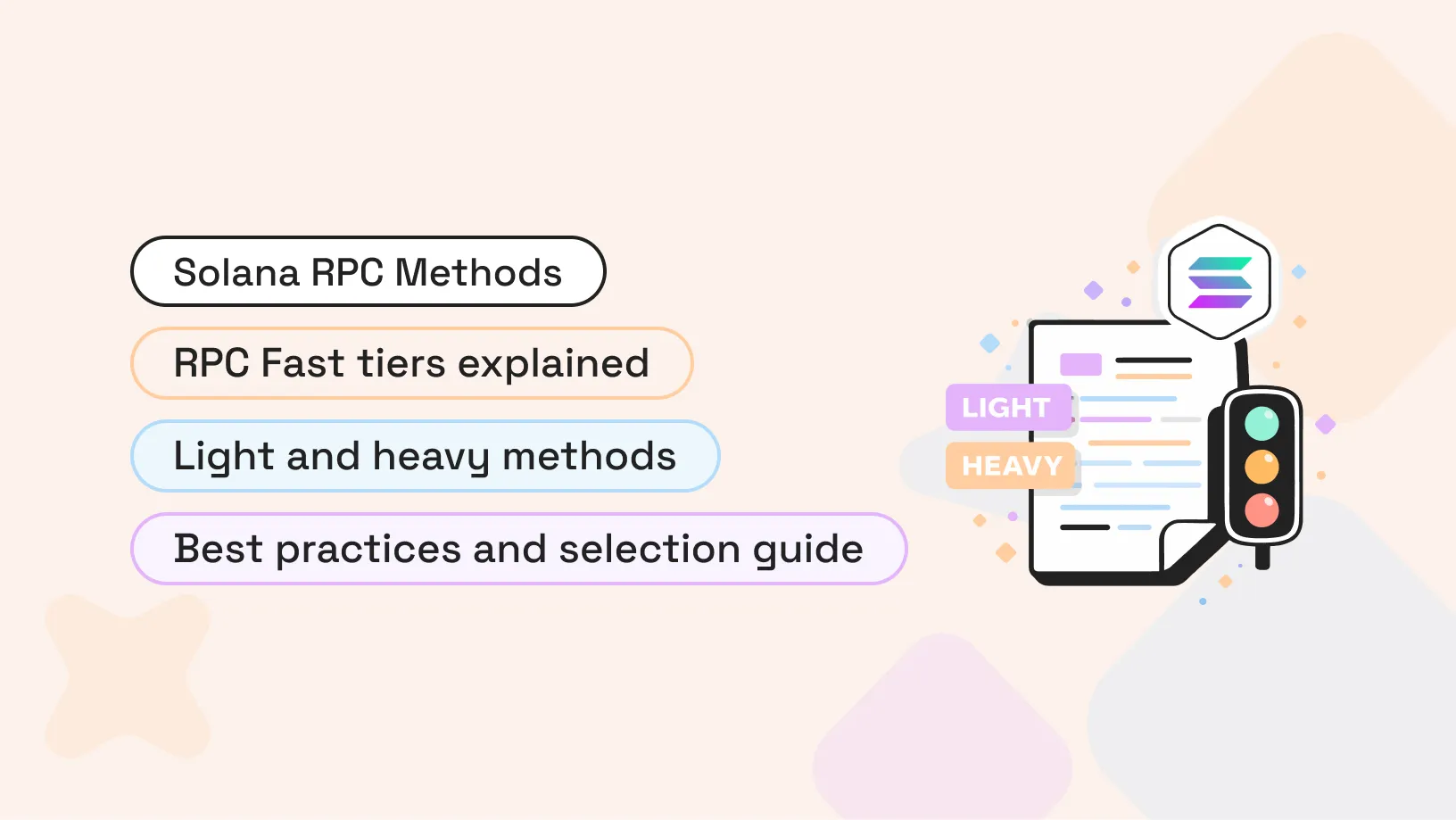
Mizar reached out with an urgent request: deploy new nodes on Solana and Base — fast. Their infrastructure needed to handle millions of requests, support real-time analytics, and be ready for production in just a few days.
About the client
Mizar is an all-in-one crypto trading platform that bridges CeFi and DeFi, offering advanced automation tools, wallet analytics, and copy trading across top exchanges. With a strong focus on usability and security, Mizar empowers both beginners and professionals to execute sophisticated strategies with ease. The platform’s native token, $MZR, unlocks reduced fees and added benefits for active users.

The context
To meet growing demand and expand into fast-growing ecosystems like Solana and Base, Mizar needed new infrastructure to support real-time data analytics, wallet tracking, and high-frequency trading features. The team requested a setup of two full Base mainnet nodes and one dedicated Solana RPC node, built for performance, low latency, and production readiness within days.

The goal: enable seamless access to DeFi protocols, trading pairs, and wallet intelligence on both chains, without sacrificing speed or reliability.

Mizar’s use case: real-time data, analytics, and trading across Solana and Base
Mizar integrates real-time blockchain data into its trading infrastructure to support automated bots, wallet tracking, copy trading, and analytics across both DeFi and CeFi markets. The platform processes every swap, pool creation, and liquidity change on Solana’s major DEX protocols, leveraging the Yellowstone gRPC Geyser plugin for the fastest available stream of events.
“We are collecting data to get real-time prices, swaps, and new pools so that users can trade with accurate and live data.”
— Francesco Ciuci, CEO and Co-Founder at Mizar
Mizar’s infrastructure turns this data into actionable insights. The team builds near real-time candlestick charts from swap activity, applies AI-based labels to Solana wallets, and tracks wallet performance to highlight the most profitable strategies. These analytics power features like the “Best deal wallet finder” and token-specific insights that help users spot early opportunities.

On the Base blockchain, Mizar depends on high-throughput RPC endpoints to decode smart contract events, track token transfers, and analyze state changes in real time. Core methods include eth_call, eth_getLogs, eth_getBlockByNumber, and eth_getTransactionReceipt. To handle peak volatility—such as new token launches or sudden market movements—the platform scales request volumes dynamically using parallel batching and WebSocket subscriptions.
Across both Solana and Base, performance and uptime are critical. Mizar handles millions of requests daily, and even milliseconds of delay can impact trade execution, front-running protection, or strategy accuracy.
“I think the RPC Fast team is very professional, and the quality of the service they provide is awesome.”
— Francesco Ciuci, CEO and Co-Founder at Mizar
The challenge: scaling fast, without compromise
As Mizar expanded support to new chains like Base and Solana, the team needed a reliable infrastructure partner to deliver:
- Low-latency RPC and gRPC nodes ready in production within days, not weeks;
- Continuous uptime to avoid missing blocks or market signals;
- Real-time monitoring tools for visibility into request speed, sync status, and system health;
- Custom pipelines for analytics and trading logic integration.
The analytics component was central to this project: without fresh and precise on-chain data, Mizar wouldn’t be able to provide accurate prices, wallet rankings, or trade execution signals. RPC Fast ability to deliver high-performance nodes on short notice—combined with infrastructure flexibility from OVHcloud—was key to making this expansion successful.
Technical architecture and infrastructure decisions
Running high-performance nodes—especially for chains like Solana—requires more than just powerful hardware. It demands infrastructure that is reliable, latency-optimized, and scalable under pressure.
Solana nodes alone consume around 80TB of bandwidth monthly (split evenly between inbound and outbound traffic) and require significant RAM and CPU resources. These compute-heavy workloads are not well-suited to public cloud-only solutions due to performance bottlenecks and cost inefficiencies. Instead, bare metal servers remain the preferred choice.
To meet these demands, RPC Fast partnered with OVHcloud, selecting it for its combination of dedicated hardware, fast provisioning, and blockchain-friendly policies. In addition to excellent price-to-performance ratios, OVHcloud enables rapid hardware replacement, crucial for minimizing downtime in case of disconnects or failures.
“When it comes to hosting blockchain infrastructure, delays in getting replacement hardware can be critical. With OVHcloud, we’re able to deploy Solana-ready nodes in just 1–2 days—far faster than most alternatives.”
The solution also uses hybrid infrastructure:
- Bare metal servers handle high-load Solana and Base nodes;
- Public cloud instances host lightweight components like the Kubernetes control plane, monitoring tools, and log aggregators.
This setup combines the power of bare metal with the flexibility of the cloud, enabling streamlined operations, secure container orchestration via K3s (a lightweight Kubernetes distribution), and modular scaling.
To reduce Solana provisioning time, PRC Fast pre-deploys spare active nodes, cutting sync times from over 6 hours to just 15 minutes when needed.

Base mainnet full nodes
Mizar deployed two Base Mainnet full nodes to support its expansion into the Ethereum Layer 2 ecosystem. These nodes are mission-critical for decoding smart contract events, analyzing token activity, and maintaining fast, uninterrupted access to all DeFi data on Base.
Operating within milliseconds of latency, the Base nodes power Mizar’s pipelines for:
- Swap tracking;
- Liquidity monitoring;
- Wallet activity analysis;
- Contract call decoding.
This data feeds directly into the platform’s trading engine, allowing Mizar to maintain real-time insights into fast-moving Base markets, react instantly to token launches, and deliver precision tools to its users.
Real-time performance across Base and Solana
The two Base Mainnet full nodes deployed for Mizar serve as the foundation for a wide range of trading analytics and real-time features. These nodes support:
- Live indexing of DEX activity—capturing swaps, liquidity changes, and token launches as they happen;
- On-chain data extraction—powering dashboards, price feeds, and token performance charts;
- Wallet behavior analysis—labeling wallets based on smart contract interactions and trading patterns;
- Opportunity detection—helping users identify arbitrage, momentum, or early-entry possibilities.
Mizar monitors swap activity, liquidity events, and contract interactions across major Base DEXs and protocols, allowing its users to act faster and smarter.
“The performance of the Base nodes has been outstanding—reliable, responsive under load, and tightly integrated with our monitoring systems. Log delivery, sync speed, and latency consistently meet our expectations for production workloads.”
Solana cluster: RPC node deployment and advanced analytics
To complement the Base infrastructure, RPC Fast provisioned and configured a dedicated Solana RPC node built for ultra-low-latency access and high-volume data ingestion.
Key features of the Solana setup include:
- Yellowstone gRPC Geyser integration – providing faster and more flexible data streams compared to native Solana websockets;
- DEX event collection in real time – covering swaps, pool creation, and liquidity changes across Solana’s top protocols;
- Integration with advanced tools, such as Jito’s ShredStream and BloXroute’s Optimized Feed Relay via RPC Fast nodes, further reduces latency and improves data delivery precision.
The Solana node feeds Mizar’s analytics engine with high-fidelity, real-time data. This supports critical platform features like:
- Real-time candlestick chart rendering;
- Wallet profitability labeling through AI models;
- Token trend analysis and portfolio optimization.
This infrastructure allows Mizar to not only match the speed of the market, but to stay ahead of it.
Optimization, tuning, and custom engineering
To ensure that Mizar’s analytics and trading logic work with the freshest possible data, RPC Fast implemented a full range of node-level optimizations:
- Solana RPC tuning—key methods like
getAccountInfo,getTokenAccountBalance, andgetBlockTimewere stabilized and fine-tuned for high-throughput, low-latency use. - Hardware-level enhancements—including multi-NVMe SSD setups for I/O speed, CPU governor tweaks to boost Proof-of-History processing, and custom
accountsDBindex adjustments for wallet-related queries. - Uptime reliability—maintenance tasks like Agave upgrades are fully automated and completed in ~30 minutes with instant sync recovery; alerting and health checks ensure that any node desynchronization is automatically resolved.
Transaction speed improvements with RPC Fast
Mizar’s infrastructure was further enhanced through the RPC Fast Trader API, integrated with BloXroute’s Optimized Feed Relay. This allowed for:
- Ultra-low-latency transaction sending;
- Advanced features like staked validator routing and front-running protection;
- Balanced operation modes for optimized performance during peak activity.
This gave Mizar traders a noticeable edge in execution speed, especially in fast-moving DEX markets.
Custom integrations and observability
In response to Mizar’s request, RPC Fast delivered a dedicated Grafana monitoring dashboard tailored to node performance. The dashboard includes:
- RPC request volumes and latency by method;
- Sync speed and node health metrics;
- Live gRPC subscription tracking;
- Historical data flow trends and usage patterns.
Mizar uses the dashboard regularly to monitor infrastructure status and ensure uninterrupted trading performance.
In-house reverse proxy and gRPC observability
RPC Fast also built a custom reverse proxy for Yellowstone gRPC, integrated with RPC Fast’s control panel. It provides:
- Authentication support;
- Enhanced error and volume tracking;
- Load balancing across gRPC backends;
- Stream-level health checks and metrics.
These tools make the system more robust and transparent, critical for a platform handling millions of requests per day.
Ongoing support and technical partnership
Throughout the project, RPC Fast provided hands-on support from two dedicated engineers, offering not only issue resolution but strategic guidance on scaling and best practices.
“I am very satisfied with the service. The nodes are stable, and we have direct access to excellent technical support. Vladyslav and Oleksandr are very knowledgeable—not only about Solana but about how to run performant infrastructure in general.
It took just 2–3 days to get the Solana node running. The gRPC stream is the fastest way to get live data, and the dashboard is incredibly helpful—I check it every few days to make sure everything’s running smoothly.”
—Francesco Ciuci, CEO and Co-Founder at Mizar
Results and impact
- Deployment speed—Solana and Base nodes were fully operational within 2–3 days, exceeding typical provisioning timelines;
- Performance under load—latency, sync speed, and reliability consistently met or surpassed expectations;
- Infrastructure intelligence—custom dashboards, real-time observability, and advanced RPC routing ensured maximum transparency and speed;
- Client satisfaction—direct engineering support, proactive optimization, and fast turnaround times made RPC Fast a long-term technical ally.
“At Dysnix & RPC Fast, we're truly dedicated to providing outstanding blockchain infrastructure, and we couldn’t have done it without the right hardware foundation. Bare metal solutions from OVHcloud empowered us to equip Mizar with the high-performance, cost-efficient nodes they needed to grow.”
—Daniel Yavorovych, CTO at Dysnix & RPC Fast
Looking to scale your trading infrastructure? Our dedicated nodes, expert support, and custom engineering make scaling seamless.
Talk to us and see how RPC Fast can power your next stage of growth.



















.svg)
.svg)
.svg)

